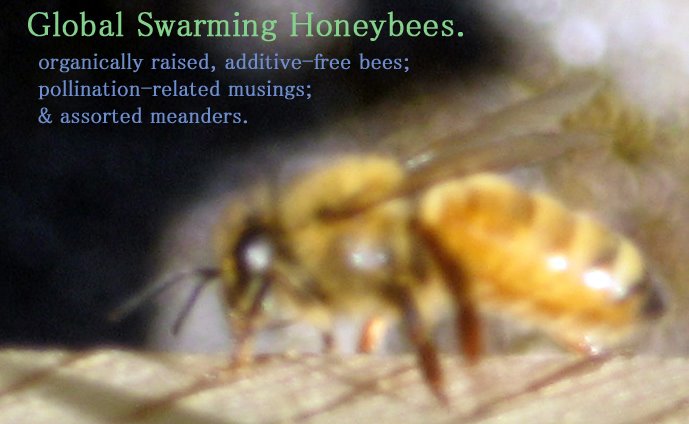A highly worthwhile article appeared in the L.A. Times on July 30th regarding the possible link between the "disappearing honeybees" (Colony Collapse Disorder) and Bayer pesticides. Here's a taste:
"It's likely that most people have never heard of Gaucho. And no, it's not a South American cowboy. I'm talking about a pesticide.Excerpted from Buzzzzzzzz kill by Al Meyerhoff, Los Angeles Times, July 30, 2008
"There is increasing reason to believe that Gaucho and other members of a family of highly toxic chemicals -- neonicotinoids -- may be responsible for the deaths of billions of honeybees worldwide. Some scientists believe that these pesticides, which are applied to seeds, travel systemically through the plant and leave residues that contaminate the pollen, resulting in bee death or paralysis. The French refer to the effect as 'mad bee disease' and in 1999 were the first to ban the use of these chemicals, which are currently only marketed by Bayer (the aspirin people) under the trade names Gaucho and Poncho. Germany followed suit this year, and its agricultural research institute said it concluded that the poisoning of the bees was because of the rub-off of the pesticide clothianidin (that's Pancho) from corn seeds.
So why did the U.S. Environmental Protection Agency in 2002 grant an 'emergency' exemption allowing increased use of Gaucho -- typically invoked during a major infestation -- when only a few beetles were found in blueberries? Why did the agency also grant a "conditional" registration for its close relative, Pancho, allowing the chemical on the market with only partial testing? And why is the agency, hiding behind a curtain of "trade secrets," still refusing to disclose whether the additional tests required of companies in such cases were conducted and, if so, with what results?
"Therein lies a tale. Most pesticides, we're told, are safe. So we add about 5 billion pounds a year of these deadly chemicals to our world, enough to encircle the planet if it were packaged in 100-pound sacks...."
Read the whole important thing right here.






No comments:
Post a Comment